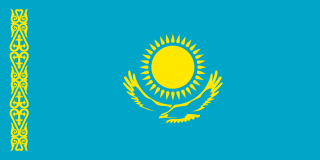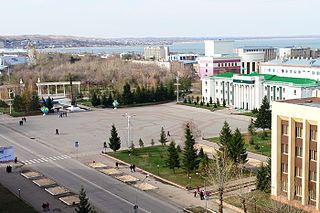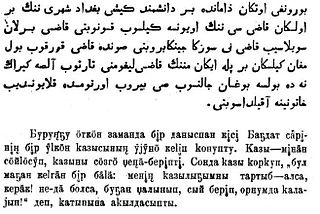Sources
- Wixman. The Peoples of the USSR. p. 42
The Shala Kazakh are a labelled group of Kazakhs who live in Kazakhstan. However, they do not belong to any of the three main Kazakh tribes.
The word Shala Kazakh has a second meaning in Kazakhstan. It means part of the Kazakh society who don't know their native language well or don't know it at all – the Kazakh language.
The actual translation for "shala" or "chala" is half. Thus, the whole meaning is "half Kazakh", i.e. the person who does not know and does not like his/her native language. The word is considered to be derogatory, shameful term for Kazakhs.
There is a main reason that so many Kazakh people don't know their language – due to the russification of all non-Slavic nations and minorities in the Soviet Union, many Kazakhs forgot their language. There are many young people who do not speak Kazakh in Kazakhstan today.

Kazakhstan, officially the Republic of Kazakhstan, is a landlocked country mostly in Central Asia, with a small part in Eastern Europe. It borders Russia to the north and west, China to the east, Kyrgyzstan to the southeast, Uzbekistan to the south, and Turkmenistan to the southwest, with a coastline along the Caspian Sea. Its capital is Astana. Kazakhstan is the world's ninth-largest country by land area and the largest landlocked country in the world. It has a population of 20 million people and one of the lowest population densities in the world, at fewer than 6 people per square kilometre. Ethnic Kazakhs constitute a majority of the population, while ethnic Russians form a significant minority. Officially secular, Kazakhstan is a Muslim-majority country, although ethnic Russians in the country form a sizeable Christian community.

Kazakh or Qazaq is a Turkic language of the Kipchak branch spoken in Central Asia by Kazakhs. It is closely related to Nogai, Kyrgyz and Karakalpak. It is the official language of Kazakhstan and a significant minority language in the Ili Kazakh Autonomous Prefecture in Xinjiang, north-western China and in the Bayan-Ölgii Province of western Mongolia. The language is also spoken by many ethnic Kazakhs throughout the former Soviet Union, Germany, and Turkey.
A vocabulary is a set of words, typically the set in a language or the set known to an individual. The word vocabulary originated from the Latin vocabulum, meaning "a word, name". It forms an essential component of language and communication, helping convey thoughts, ideas, emotions, and information. Vocabulary can be oral, written, or signed and can be categorized into two main types: active vocabulary and passive vocabulary. An individual's vocabulary continually evolves through various methods, including direct instruction, independent reading, and natural language exposure, but it can also shrink due to forgetting, trauma, or disease. Furthermore, vocabulary is a significant focus of study across various disciplines, like linguistics, education, psychology, and artificial intelligence. Vocabulary is not limited to single words; it also encompasses multi-word units known as collocations, idioms, and other types of phraseology. Acquiring an adequate vocabulary is one of the largest challenges in learning a second language.

A double negative is a construction occurring when two forms of grammatical negation are used in the same sentence. This is typically used to convey a different shade of meaning from a strictly positive sentence. Multiple negation is the more general term referring to the occurrence of more than one negative in a clause. In some languages, double negatives cancel one another and produce an affirmative; in other languages, doubled negatives intensify the negation. Languages where multiple negatives affirm each other are said to have negative concord or emphatic negation. Portuguese, Persian, French, Russian, Polish, Bulgarian, Greek, Spanish, Old English, Italian, Afrikaans, and Hebrew are examples of negative-concord languages. This is also true of many vernacular dialects of modern English. Chinese, Latin, German, Dutch, Japanese, Swedish and modern Standard English are examples of languages that do not have negative concord. Typologically, negative concord occurs in a minority of languages.

The Kazakhs are a Turkic people native to Central Asia and Eastern Europe, mainly Kazakhstan, but also parts of northern Uzbekistan and the border regions of Russia, as well as northwestern China and western Mongolia. The Kazakhs arose from the merging of the medieval tribes of Turkic and Mongolic origin in the 15th century.

The tenge is the currency of Kazakhstan. It is divided into 100 tiyn.
Kurultai was a political and military council of ancient Mongol and Turkic chiefs and khans. The root of the word is Proto-Mongolic *kura-, *kurija- "to collect, to gather" from which is formed khural meaning "meeting" or "assembly" in Turkic and Mongolian languages. Khuraldai, khuruldai or khuraldaan means "gathering" or, more literally, "intergatheration". From this same root arises the Mongolian word хурим, which means "feast" and originally referred to large festive gatherings on the steppe but is used mainly in the sense of "wedding" in modern times.

Kokshetau, formerly known as Kokchetav is a lakeside city in northern Kazakhstan and the capital of Akmola Region (oblys), which stretches along the southern shore of Lake Kopa, lying in the north of Kokshetau Hills, a northern subsystem of the Kokshetau Uplands (Saryarka) and the southern edge of the Ishim Plain. It is named after the Mount Kokshe.

The Ili is a river situated in Northwest China and Southeastern Kazakhstan. It flows from the Ili Kazakh Autonomous Prefecture of the Xinjiang Uighur Autonomous Region to the Almaty Region in Kazakhstan.

Tatars in Bulgaria are Crimean Tatar, but also Nogai Tatar minorities in Bulgaria.

Three alphabets are used to write Kazakh: the Cyrillic, Latin and Arabic scripts. The Cyrillic script is used in Kazakhstan and Mongolia. An October 2017 Presidential Decree in Kazakhstan ordered that the transition from Cyrillic to a Latin script be completed by 2031. The Arabic script is used in Saudi Arabia, Iran, Afghanistan, and parts of China.

There has been a substantial population of Russians in Kazakhstan since the 19th century. Although their numbers have been reduced since the breakup of the Soviet Union, they remain prominent in Kazakh society today. Russians formed a plurality of the Kazakh SSR's population for several decades.

The Lyuli, Jughi or Jugi are a branch of the Ghorbati people living in Central Asia, primarily Tajikistan, Uzbekistan, Turkmenistan, Kazakhstan, and southern Kyrgyzstan; also, related groups can be found in Turkey, and the Balkans, Crimea, Southern Russia and Afghanistan. They speak ethnolects of the Persian and Turkic language and practice Sunni Islam. The terms Lyuli and Jugi are considered pejorative. They have a clan organization. Division into sub-clans is also practiced. The Lyuli community is extremely closed towards non-Lyuli.

The wedding in native Kazakh language is Uilenu toyi, the marriage is Ui bolu.
Oralman is a term used by Kazakh authorities to describe ethnic Kazakhs who have re-immigrated to Kazakhstan since the country gained independence from the Soviet Union in 1991.
Nurlan is a Turkic masculine given name that is mostly common in Azerbaijan, Kazakhstan and Uzbekistan. The name is essentially a combination of the Arabic word Noor meaning light, ray or shine and the Turkic word "Lan/Ulan" which means lion in most Turkic languages. Thus, the name itself can be translated into "radiant lion".

Abdizhamil Karimuly Nurpeisov was a Soviet and Kazakh writer and translator.

The Kazakh famine of 1930–1933, also known as the Asharshylyk, was a famine during which approximately 1.5 million people died in the Kazakh Autonomous Socialist Soviet Republic, then part of the Russian Socialist Federative Soviet Republic in the Soviet Union, of whom 1.3 million were ethnic Kazakhs. An estimated 38 to 42 percent of all Kazakhs died, the highest percentage of any ethnic group killed by the Soviet famine of 1930–1933. Other research estimates that as many as 2.3 million died. A committee created by the Kazakhstan parliament chaired by Historian Manash Kozybayev concluded that the famine was "a manifestation of the politics of genocide", with 1.75 million victims.
Ninety One or 91 is a Kazakh boy group formed by JUZ Entertainment in 2015. The band consists of four members: Alem, Ace, Zaq, and Bala. Once a five-member group, A.Z. left in 2020. Ninety One is the pioneer act of a new musical genre called Q-pop (Qazaq-pop) which could be called a symbiosis of Western and Asian pop music. The group was produced by Yerbolat Bedelkhan, a member of the Kazakh music unit "Orda".
Astrakhan Russian is an umbrella term for the regional varieties of the Russian language spoken in Astrakhan Oblast, a federal subject of Russia. Astrakhan Oblast is one of the most diverse parts of the country in terms of ethnic groups and languages. The major groups are ethnic Russians, Kazakhs (17%) and Tatars (7%), but many others are also present and influence the shared local identity, culture and language varieties.